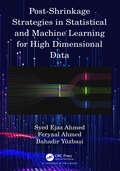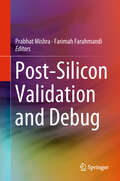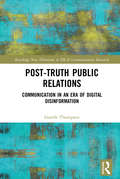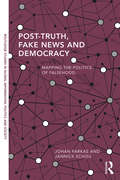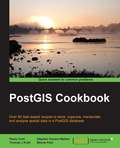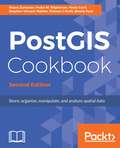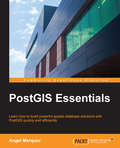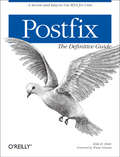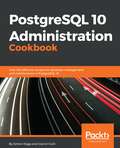- Table View
- List View
Post-Secondary Education and Technology
by Rebecca Clothey Stacy Austin-Li John C. WeidmanAs the global commitment to educational access has become enshrined in all levels of society, new technologies have also been developed that hold tremendous promise for enabling these goals. This book looks at trends and challenges for expanding access to post-secondary education via technology through a set of case studies and analyses.
Post-Shrinkage Strategies in Statistical and Machine Learning for High Dimensional Data
by Syed Ejaz Ahmed Feryaal Ahmed Bahadir YüzbaşıThis book presents some post-estimation and predictions strategies for the host of useful statistical models with applications in data science. It combines statistical learning and machine learning techniques in a unique and optimal way. It is well-known that machine learning methods are subject to many issues relating to bias, and consequently the mean squared error and prediction error may explode. For this reason, we suggest shrinkage strategies to control the bias by combining a submodel selected by a penalized method with a model with many features. Further, the suggested shrinkage methodology can be successfully implemented for high dimensional data analysis. Many researchers in statistics and medical sciences work with big data. They need to analyse this data through statistical modelling. Estimating the model parameters accurately is an important part of the data analysis. This book may be a repository for developing improve estimation strategies for statisticians. This book will help researchers and practitioners for their teaching and advanced research, and is an excellent textbook for advanced undergraduate and graduate courses involving shrinkage, statistical, and machine learning. The book succinctly reveals the bias inherited in machine learning method and successfully provides tools, tricks and tips to deal with the bias issue. Expertly sheds light on the fundamental reasoning for model selection and post estimation using shrinkage and related strategies. This presentation is fundamental, because shrinkage and other methods appropriate for model selection and estimation problems and there is a growing interest in this area to fill the gap between competitive strategies. Application of these strategies to real life data set from many walks of life. Analytical results are fully corroborated by numerical work and numerous worked examples are included in each chapter with numerous graphs for data visualization. The presentation and style of the book clearly makes it accessible to a broad audience. It offers rich, concise expositions of each strategy and clearly describes how to use each estimation strategy for the problem at hand. This book emphasizes that statistics/statisticians can play a dominant role in solving Big Data problems, and will put them on the precipice of scientific discovery. The book contributes novel methodologies for HDDA and will open a door for continued research in this hot area. The practical impact of the proposed work stems from wide applications. The developed computational packages will aid in analyzing a broad range of applications in many walks of life.
Post-Silicon Validation and Debug
by Prabhat Mishra Farimah FarahmandiThis book provides a comprehensive coverage of System-on-Chip (SoC) post-silicon validation and debug challenges and state-of-the-art solutions with contributions from SoC designers, academic researchers as well as SoC verification experts. The readers will get a clear understanding of the existing debug infrastructure and how they can be effectively utilized to verify and debug SoCs.
Post-TV
by Michael StrangeloveIn the late 2000s, television no longer referred to an object to be watched; it had transformed into content to be streamed, downloaded, and shared. Tens of millions of viewers have "cut the cord," abandoned cable television, tuned into online services like Netflix, Hulu, and YouTube, and also watch pirated movies and programmes at an unprecedented rate. The idea that the Internet will devastate the television and film industry in the same way that it gutted the music industry no longer seems farfetched. The television industry, however, remains driven by outmoded market-based business models that ignore audience behaviour and preferences.In Post-TV, Michael Strangelove explores the viewing habits and values of the post-television generation, one that finds new ways to exploit technology to find its entertainment for free, rather than for a fee. Challenging the notion that the audience is constrained by regulatory and industrial regimes, Strangelove argues that cord-cutting, digital piracy, increased competition, and new modes of production and distribution are making audiences and content more difficult to control, opening up the possibility of a freer, more democratic, media environment.A follow-up to the award-winning Watching YouTube, Post-TV is a lively examination of the social and economic implications of a world where people can watch what they want, when they want, wherever they want.
Post-Truth Public Relations: Communication in an Era of Digital Disinformation (Routledge New Directions in PR & Communication Research)
by Gareth ThompsonThis book explores the purpose, practice and effects of public relations (PR) at a time that has been variously described as an era of populism, post-truth and fake news. It considers how PR processes have contributed to the current social condition of post-truth and what constitutes PR work in this environment. Post-Truth Public Relations: Communication in an Era of Digital Disinformation proposes that while we can now look back upon the last 80–100 years as a period of classical PR, that style is being supplemented by the emergence of a post-classical form of PR that has emerged in response to the post-truth era. This new style of PR consists of a mixed repertoire of communicative work that matches the new geometry of digital media and delivers a mix of online engagement and persuasion in order to meet the needs of increasingly partisan audiences. Using contemporary case studies and original interviews with PR practitioners in several countries, including China and the Philippines, the book investigates how PR workers have reconciled their role as communicative intermediaries with the post-truth era of digital disinformation. This thought-provoking book will be of great interest to researchers and advanced students interested in the changing nature of PR and its practice.
Post-Truth, Fake News and Democracy: Mapping the Politics of Falsehood (Routledge Studies In Global Information, Politics And Society Ser.)
by Jannick Schou Johan FarkasThe new edition of Post-Truth, Fake News and Democracy offers an updated overview and critical discussion of contemporary discourses around truth, misinformation, and democracy, while also mapping cutting-edge scholarship. Through in-depth analyses of news articles, commentaries, academic publications, policy briefs, and political speeches, the book engages with the underlying normative ideas that shape how fake news is being addressed across the globe. Doing so, it provides an innovative, critical contribution to contemporary debates on democracy, post-truth, and politics. Three new chapters: Chapter 2 provides an outline of the scholarly field of research into fake news; Chapter 5 examines how issues of fake news and (mis)information have become intertwined with contemporary crisis events; and Chapter 9 presents democratic alternatives to post-truth solutionism. A new foreword by Professor Sarah Banet-Weiser. Fully updated examples and studies from contemporary events, including the COVID-19 pandemic, the United States Capitol attack, and the Russian invasion of Ukraine. Extended discussions on the causes of democratic decline, currently proposed solutions to fake news, and democratic alternatives to our current predicament. Interesting, informative, and well documented, Post-Truth, Fake News and Democracy continues its commitment to understand and engage with the current state and future of democracy.
Post-Truth, Fake News and Democracy: Mapping the Politics of Falsehood (Routledge Studies in Global Information, Politics and Society)
by Jannick Schou Johan FarkasWestern societies are under siege, as fake news, post-truth and alternative facts are undermining the very core of democracy. This dystopian narrative is currently circulated by intellectuals, journalists and policy makers worldwide. In this book, Johan Farkas and Jannick Schou deliver a comprehensive study of post-truth discourses. They critically map the normative ideas contained in these and present a forceful call for deepening democracy. The dominant narrative of our time is that democracy is in a state of emergency caused by social media, changes to journalism and misinformed masses. This crisis needs to be resolved by reinstating truth at the heart of democracy, even if this means curtailing civic participation and popular sovereignty. Engaging with critical political philosophy, Farkas and Schou argue that these solutions neglect the fact that democracy has never been about truth alone: it is equally about the voice of the democratic people. Post-Truth, Fake News and Democracy delivers a sobering diagnosis of our times. It maps contemporary discourses on truth and democracy, foregrounds their normative foundations and connects these to historical changes within liberal democracies. The book will be of interest to students and scholars studying the current state and future of democracy, as well as to a politically informed readership.
Post-Truth: The New War on Truth and How to Fight Back
by Matthew d'AnconaWelcome to the Post-Truth era— a time in which the art of the lie is shaking the very foundations of democracy and the world as we know it. The Brexit vote; Donald Trump’s victory; the rejection of climate change science; the vilification of immigrants; all have been based on the power to evoke feelings and not facts. So what does it all mean and how can we champion truth in in a time of lies and ‘alternative facts’?In this eye-opening and timely book, Post-Truth is distinguished from a long tradition of political lies, exaggeration and spin. What is new is not the mendacity of politicians but the public’s response to it and the ability of new technologies and social media to manipulate, polarise and entrench opinion. Where trust has evaporated, conspiracy theories thrive, the authority of the media wilt and emotions matter more than facts . Now, one of the UK’s most respected political journalists, Matthew d’Ancona investigates how we got here, why quiet resignation is not an option and how we can and must fight back.
Post-disaster Navigation and Allied Services over Opportunistic Networks (Smart Innovation, Systems and Technologies #228)
by Siuli Roy Sipra Das Bit Suman BhattacharjeeThis book provides the details of developing a digital pedestrian map construction system over the intermittently connected mobile network. Over the past couple of decades, countries across the world, both developing and developed, have witnessed a significant number of disasters. Thus, it has become mandatory for each of the disaster-prone countries to equip themselves with appropriate measures to cope with the challenges of providing post-disaster services. Some of the serious challenges are incapacitated communication infrastructure, unstable power supply and inaccessible road networks. Out of these challenges, the destruction of road networks, especially in developing countries, acts as a major hindrance to effective disaster management. To be more specific, the success of a disaster response operation generally depends on the speed of evacuation and transportation of adequate amount of relief materials at the right time to the disaster-affected areas. Hence, map-based navigation support is a primary requirement for post-disaster relief operations. This book also provides the solution of the two other important post-disaster management services such as situational awareness and resource allocation. Both of these services are invariably dependent on the existence of navigation support. Finally, in order to offer such services, the other challenge is to address the problem of incapacitated communication infrastructure. This book also deals with such challenges in post-disaster scenarios and develops automated post-disaster management services.
Post-industrial Robotics: Exploring Informed Architecture (Springerbriefs In Architectural Design And Technology Ser.)
by Angelo Figliola Alessandra BattistiThis book highlights the concept of informed architecture as an alternative to performance-based approaches. Starting with an analysis of the state of art, the book defines an operative methodology in which performative parameters lead to the generation of the shape becoming the design’s input, rather than being mere quantitative parameters. It then uses case studies to investigate the methodology. Lastly, the book discusses a novel way of conceiving and using the manufacturing tool, which is the basis for the definition of informed architectures in relation to data usage and the optimization process.
PostGIS Cookbook
by Thomas J. Kraft Stephen Vincent Mather Paolo Corti Bborie ParkAn easy-to-use guide, full of hands-on recipes for manipulating spatial data in a PostGIS database. Each topic is explained and placed in context, and for the more inquisitive, there are more details of the concepts used. If you are a web developer or a software architect, especially in location-based companies, and want to expand the range of techniques you are using with PostGIS, then this book is for you. You should have some prior experience with PostgreSQL database and spatial concepts.
PostGIS Cookbook: Store, organize, manipulate, and analyze spatial data, 2nd Edition
by Stephen Vincent Mather Bborie Park Mayra Zurbarán Thomas Kraft Pedro WightmanCreate and manage spatial data with PostGISKey FeaturesImport and export geographic data from the PostGIS database using the available tools Maintain, optimize, and fine-tune spatial data for long-term viability Utilize the parallel support functionality that was introduced in PostgreSQL 9.6Book DescriptionPostGIS is a spatial database that integrates the advanced storage and analysis of vector and raster data, and is remarkably flexible and powerful. PostGIS provides support for geographic objects to the PostgreSQL object-relational database and is currently the most popular open source spatial databases. If you want to explore the complete range of PostGIS techniques and expose related extensions, then this book is for you. This book is a comprehensive guide to PostGIS tools and concepts which are required to manage, manipulate, and analyze spatial data in PostGIS. It covers key spatial data manipulation tasks, explaining not only how each task is performed, but also why. It provides practical guidance allowing you to safely take advantage of the advanced technology in PostGIS in order to simplify your spatial database administration tasks. Furthermore, you will learn to take advantage of basic and advanced vector, raster, and routing approaches along with the concepts of data maintenance, optimization, and performance, and will help you to integrate these into a large ecosystem of desktop and web tools.By the end, you will be armed with all the tools and instructions you need to both manage the spatial database system and make better decisions as your project's requirements evolve.What you will learnImport and export geographic data from the PostGIS database using the available toolsStructure spatial data using the functionality provided by a combination of PostgreSQL and PostGISWork with a set of PostGIS functions to perform basic and advanced vector analysesConnect PostGIS with PythonLearn to use programming frameworks around PostGISMaintain, optimize, and fine-tune spatial data for long-term viabilityExplore the 3D capabilities of PostGIS, including LiDAR point clouds and point clouds derived from Structure from Motion (SfM) techniquesDistribute 3D models through the Web using the X3D standardUse PostGIS to develop powerful GIS web applications using Open Geospatial Consortium web standardsMaster PostGIS RasterWho this book is forThis book is for developers who need some quick solutions for PostGIS. Prior knowledge of PostgreSQL and spatial concepts would be an added advantage.
PostGIS Essentials
by Angel MarquezThis book is a quick guide for anyone who wants to get started with PostGIS and develop their very own GIS projects quickly.
PostGIS in Action
by Regina O. Obe Leo S. HsuSummaryPostGIS in Action, Second Edition teaches readers of all levels to write spatial queries that solve real-world problems. It first gives you a background in vector-, raster-, and topology-based GIS and then quickly moves into analyzing, viewing, and mapping data. This second edition covers PostGIS 2.0 and 2.1 series, PostgreSQL 9.1, 9.2, and 9.3 features, and shows you how to integrate with other GIS tools.Purchase of the print book includes a free eBook in PDF, Kindle, and ePub formats from Manning Publications.About the BookProcessing data tied to location and topology requires specialized know-how. PostGIS is a free spatial database extender for PostgreSQL, every bit as good as proprietary software. With it, you can easily create location-aware queries in just a few lines of SQL code and build the back end for a mapping, raster analysis, or routing application with minimal effort.PostGIS in Action, Second Edition teaches you to solve real-world geodata problems. It first gives you a background in vector-, raster-, and topology-based GIS and then quickly moves into analyzing, viewing, and mapping data. You'll learn how to optimize queries for maximum speed, simplify geometries for greater efficiency, and create custom functions for your own applications. You'll also learn how to apply your existing GIS knowledge to PostGIS and integrate with other GIS tools.Familiarity with relational database and GIS concepts is helpful but not required.What's InsideAn introduction to spatial databasesGeometry, geography, raster, and topology spatial types, functions, and queriesApplying PostGIS to real-world problemsExtending PostGIS to web and desktop applicationsUpdated for PostGIS 2.x and PostgreSQL 9.xAbout the AuthorsRegina Obe and Leo Hsu are database consultants and authors. Regina is a member of the PostGIS core development team and the Project Steering Committee.Table of ContentsPART 1 INTRODUCTION TO POSTGISWhat is a spatial database?Spatial data typesSpatial reference system considerationsWorking with real dataUsing PostGIS on the desktopGeometry and geography functionsRaster functionsPostGIS TIGER geocoderGeometry relationshipsPART 2 PUTTING POSTGIS TO WORKProximity analysisGeometry and geography processingRaster processingBuilding and using topologiesOrganizing spatial dataQuery performance tuningPART 3 USING POSTGIS WITH OTHER TOOLSExtending PostGIS with pgRouting and procedural languagesUsing PostGIS in web applications
PostGIS in Action, Third Edition
by Regina Obe Leo HsuPostGIS in Action, Third Edition shows you how to solve real-world geodata problems. You&’ll go beyond basic mapping, and explore custom functions for your applications.Summary In PostGIS in Action, Third Edition you will learn: An introduction to spatial databases Geometry, geography, raster, and topology spatial types, functions, and queries Applying PostGIS to real-world problems Extending PostGIS to web and desktop applications Querying data from external sources using PostgreSQL Foreign Data Wrappers Optimizing queries for maximum speed Simplifying geometries for greater efficiency PostGIS in Action, Third Edition teaches readers of all levels to write spatial queries for PostgreSQL. You&’ll start by exploring vector-, raster-, and topology-based GIS before quickly progressing to analyzing, viewing, and mapping data. This fully updated third edition covers key changes in PostGIS 3.1 and PostgreSQL 13, including parallelization support, partitioned tables, and new JSON functions that help in creating web mapping applications. Purchase of the print book includes a free eBook in PDF, Kindle, and ePub formats from Manning Publications. About the technology PostGIS is a spatial database extender for PostgreSQL. It offers the features and firepower you need to take on nearly any geodata task. PostGIS lets you create location-aware queries with a few lines of SQL code, then build the backend for mapping, raster analysis, or routing application with minimal effort. About the book PostGIS in Action, Third Edition shows you how to solve real-world geodata problems. You&’ll go beyond basic mapping, and explore custom functions for your applications. Inside this fully updated edition, you&’ll find coverage of new PostGIS features such as PostGIS Window functions, parallelization of queries, and outputting data for applications using JSON and Vector Tile functions. What's inside Fully revised for PostGIS version 3.1 and PostgreSQL 13 Optimize queries for maximum speed Simplify geometries for greater efficiency Extend PostGIS to web and desktop applications About the reader For readers familiar with relational databases and basic SQL. No prior geodata or GIS experience required. About the author Regina Obe and Leo Hsu are database consultants and authors. Regina is a member of the PostGIS core development team and the Project Steering Committee. Table of Contents PART 1 INTRODUCTION TO POSTGIS 1 What is a spatial database? 2 Spatial data types 3 Spatial reference systems 4 Working with real data 5 Using PostGIS on the desktop 6 Geometry and geography functions 7 Raster functions 8 Spatial relationships PART 2 PUTTING POSTGIS TO WORK 9 Proximity analysis 10 PostGIS TIGER geocoder 11 Geometry and geography processing 12 Raster processing 13 Building and using topologies 14 Organizing spatial data 15 Query performance tuning PART 3 USING POSTGIS WITH OTHER TOOLS 16 Extending PostGIS with pgRouting and procedural languages 17 Using PostGIS in web applications
Postal (Boss Fight Books)
by Nathan Rabin Brock WilburJust as the video game console market was about to crash into the New Mexico desert in 1983, professor and sociologist David Sudnow was unearthing the secrets of &“eye, mind, and the essence of video skill&” through an exploration of Atari&’s Breakout, one of the earliest hits of the arcade world. Originally released under the title Pilgrim in the Microworld, Sudnow&’s groundbreaking longform criticism of a single game predates the rise of game studies by decades. While its earliest critics often scorned the idea of a serious book about an object of play, the book&’s modern readers remain fascinated by an obsessive, brilliant, and often hilarious quest to learn to play Breakout just as one would learn the piano. Featuring a new foreword and freshly edited text, Breakout makes a perfect addition to Boss Fight&’s lineup of critical, historical, and personal looks at single video games. We&’re proud to restore this classic to print and share with new audiences Sudnow&’s wild pilgrimage into the limitless microworld of play.
Postcolonial Politics, The Internet and Everyday Life: Pacific Traversals Online (Routledge Advances in International Relations and Global Politics)
by M.I. FranklinIn this ground-breaking study M.I. Franklin explores the form and substance of everyday life online from a critical postcolonial perspective. With Internet access and social media uses accelerating in the Global South, in-depth studies of just how non-western communities, at home and living abroad, actually use the Internet and web-based media are still relatively few. This book’s pioneering use of virtual ethnography and mixed method research in this study of a longstanding ‘media diaspora’ incorporates online participant-observation with offline fieldwork to explore how postcolonial diasporas from the south Pacific have been using the Internet since the early ways of the web. Through a critical reconsideration of the work of Michel de Certeau in light of postcolonial and feminist theories, the book provides insights into the practice of everyday life in a global and digital age by non-western participants online and offline. Critical of techno- and media-centric analyses of cyberspatial practices and power hierarchies, Franklin argues that a closer look at the content and communicative styles of these contemporary Pacific traversals suggest other Internet futures. These are visions of social media that can be more hospitable, culturally inclusive and economically equitable than those promulgated by both powerful commercial interests and state actors looking to take charge of the Internet ‘after Web 2.0’. The book will be of interest to students of international politics, media and communications, cultural studies, science and technology studies, anthropology and sociology interested in how successive waves of new media interact with shifting power relations at the intersection of politics, culture, and society.
Postdigital Aesthetics
by David M. Berry Michael DieterPostdigital Aesthetics presents a constellation of contributors who seek to unpack, explore and critically reflect on the questions raised by the notion of the postdigital and its relation to our computational everyday lives. Through a number of interventions, each chapter subjects the concept and ideas that surround our ideas of an aesthetic of the postdigital to critical examination to understand the new asterism of material digital culture in the twenty-first century. From Minecraft to post-internet art, each contributor offers an original perspective on network culture and its distinctive aesthetics and politics, and the relations between art, computation and design.
Postdigital Ethical Futures: Essays in Honour of John Reader
by Maggi Savin-Baden Maria PowerPostdigital Ethical Futures emerged from the work of the Ethical Futures Network hosted by the William Temple Foundation meeting both online and at Trinity College, Oxford. This book illustrates the research being carried out by some of the members of this network by examining the more practical aspects of the subject of religion and the digital, drawing on a wider range of disciplines and was created in memory of John Reader whose idea the text was, who died suddenly in 2023. This book examines issues of ethics as encountered in both the digital and environmental spheres, and seeks to cross the boundary between philosophy and theology.
Postdigital Humans: Transitions, Transformations and Transcendence (Postdigital Science and Education)
by Maggi Savin-BadenThis book explores approaches to developing and using postdigital humans and the impact they are having on a postdigital world. It presents current research and practices at a time when education is changing rapidly with digital, technological advances. In particular, it outlines the major challenges faced by today’s employers, developers, teachers, researchers, priests and philosophers. The book examines conceptions of postdigital humans and studies the issue in connection with ethics and employment, as well as from perspectives such as philosophy and religion.
Postdigital Participation in Education: How Contemporary Media Constellations Shape Participation (Palgrave Studies in Educational Media)
by Andreas Weich Felicitas MacgilchristThis open access book examines the interrelations and correlations of the postdigital condition and its relationship to education, with a particular focus on participation. Contributions reflect on how educational institutions are affected by the recent transformations of media technologies and practices, and how at the same time institutions such as schools and universities are supposed to enable people to participate in media practices in an informed and reflective way. How, and under what conditions, can teachers and students participate in contemporary media constellations? The book will be of interest to academics and researchers involved in teacher education, digital pedagogy, educational technology, instructional design, education philosophy and media education.
Postdigital Theologies: Technology, Belief, and Practice (Postdigital Science and Education)
by John Reader Maggi Savin-BadenThis book is about the relationships between technologies and the content of religious belief and practice. A number of models are now starting to emerge, but each of these depends on the theological or philosophical framework within which the debate is set. At at the same time, there are dilemmas operating at different ends of the spectrum. For example, at one end there is a tendency towards subsuming the digital within the divine, and at the other an instrumental stance relating to how technology is deployed. Either of these stances could be said to ignore rather than acknowledge that the human itself is being changed as a result of the interactions with the digital. The book explores the following areas: · Where is God to be found or present in the postdigital condition? · What are the implications of the postdigital condition for spirituality and indeed for the activity of God through the Holy Spirit? · How do concepts of transhumanism or posthumanism effect understandings of the incarnation? · Does the doctrine of the Trinity need revisiting in the light of the digital as medium of relationship? · Does Creation now include the postdigital? · What of the Kingdom of God now that the kingdom of the Tech giants is so powerful all-consuming?
Postfeminist Celebrity and Motherhood: Brand Mom (Routledge Research in Cultural and Media Studies)
by Jorie LagerweyThis book analyzes the intersections of celebrity, self-branding, and "mommy" culture. It examines how images of celebrity moms playing versions of themselves on reality television, social media, gossip sites, and self-branded retail outlets negotiate the complex demands of postfeminism and the current fashion for heroic, labor intensive parenting. The cultural regime of "new momism" insists that women be expert in both affective and economic labor, producing loving families, self-brands based on emotional connections with consumers, and lucrative saleable commodities. Successfully creating all three: a self-brand, a style of motherhood, and lucrative product sales, is represented as the only path to fulfilled adult womanhood and citizenship. The book interrogates the classed and racialized privilege inherent in those success stories and looks for ways that the versions of branded motherhood represented as failures might open a space for a more inclusive emergent feminism.
Postfix: A Secure and Easy-to-Use MTA for UNIX
by Kyle D. DentPostfix is a Mail Transfer Agent (MTA): software that mail servers use to route email. Postfix is highly respected by experts for its secure design and tremendous reliability. And new users like it because it's so simple to configure. In fact, Postfix has been adopted as the default MTA on Mac OS X. It is also compatible with sendmail, so that existing scripts and programs continue to work seamlesslyafter it is installed.Postfix was written by well-known security expert Wietse Venema, who reviewed this book intensively during its entire development. Author Kyle Dent covers a wide range of Postfix tasks, from virtual hosting to controls for unsolicited commercial email.While basic configuration of Postfix is easy, every site has unique needs that call for a certain amount of study. This book, with careful background explanations and generous examples, eases readers from the basic configuration to the full power of Postfix. It discusses the Postfix interfaces to various tools that round out a fully scalable and highly secure email system. These tools include POP, IMAP, LDAP, MySQL, Simple Authentication and Security Layer (SASL), and Transport Layer Security (TLS, an upgrade of SSL). A reference section for Postfix configuration parameters and an installation guide are included.Topics include:Basic installation and configurationDNS configuration for emailWorking with POP/IMAP serversHosting multiple domains (virtual hosting)Mailing listsHandling unsolicited email (spam blocking)Security through SASL and TLS From compiling and installing Postfix to troubleshooting, Postfix: The Definitive Guide offers system administrators and anyone who deals with Postfix an all-in-one, comprehensive tutorial and reference to this MTA.
PostgreSQL 10 Administration Cookbook: Over 165 effective recipes for database management and maintenance in PostgreSQL 10
by Simon Riggs Gianni CiolliA practical guide to administer, monitor and replicate your PostgreSQL 10 databaseKey FeaturesGet to grips with the capabilities of PostgreSQL 10 to administer your database more efficientlyMonitor, tune, secure and protect your database for optimal performanceA step-by-step, recipe-based guide to help you tackle any problem in PostgreSQL 10 administration with easeBook DescriptionPostgreSQL is a powerful, open source database management system with an enviable reputation for high performance and stability. With many new features in its arsenal, PostgreSQL 10 allows users to scale up their PostgreSQL infrastructure. This book takes a step-by-step, recipe-based approach to effective PostgreSQL administration.Throughout this book, you will be introduced to these new features such as logical replication, native table partitioning, additional query parallelism, and much more. You will learn how to tackle a variety of problems that are basically the pain points for any database administrator - from creating tables to managing views, from improving performance to securing your database. More importantly, the book pays special attention to topics such as monitoring roles, backup, and recovery of your PostgreSQL 10 database, ensuring high availability, concurrency, and replication.By the end of this book, you will know everything you need to know to be the go-to PostgreSQL expert in your organization.What you will learnGet to grips with the newly released PostgreSQL 10 features to improve database performance and reliabilityManage open source PostgreSQL versions 10 on various platforms.Explore best practices for planning and designing live databasesSelect and implement robust backup and recovery techniques in PostgreSQL 10Explore concise and clear guidance on replication and high availabilityDiscover advanced technical tips for experienced usersWho this book is forThis book is for database administrators, data architects, developers, or anyone with an interest in planning for, or running, live production databases using PostgreSQL. It is most suited to those looking for hands-on solutions to any problem associated with PostgreSQL administration.

